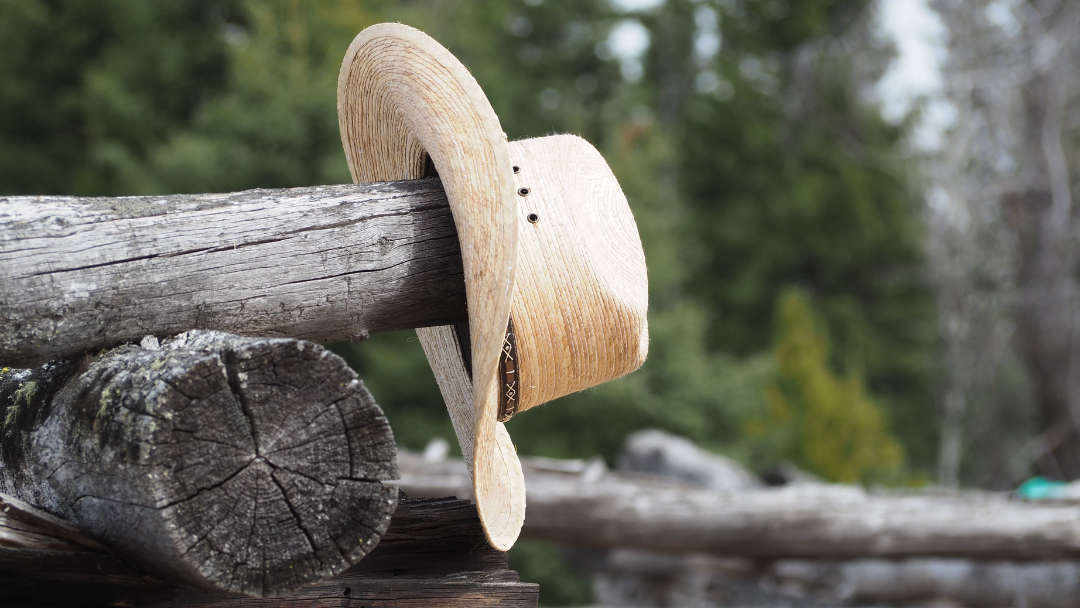TWO RIDERS MATERIALIZE FROM A SHIMMERING MIRAGE of heatwaves that dance on the blasted surface of this desert wasteland. They are men of legend, El Sombrero Blanco, the Pistolero de Puebla, and his faithful companion El Burro. They plod through the shriveling heat, drawing closer, and dust floats behind them.
True to his name, El Sombrero Blanco wears a hat as white as innocence. The wide brim shades his hawkish face. He is a gaunt man, tall and lean, with piercing eyes, an aquiline nose, and great black mustaches that frame his thin lips.
He rides a white Arabian, the horse fiery and restive beneath him, even under the wilting desert sun. Two massive revolvers hang from his tooled gun belt, one on each side. Silver spurs jingle from the heels of his boots, but they are only decorations. He has never set a spur to the Arabian’s flanks. One word of command is enough.
At El Sombrero’s right hand, always at his right hand, rides El Burro. The rotund El Burro is mounted on a tall black mule named Pedro. Under his black hat and beneath his bushy black beard, he is the dark shadow to El Sombrero’s white light.
Known to his sainted mother as Paco Valdez, El Burro’s barrel chest is festooned with bandoliers of bullets. A rifle protrudes from a saddle scabbard beneath his fat thigh. A short-barreled shotgun hangs across his broad back.
The pair of riders draws near, and a voice breaks the brooding stillness.
“I am telling you, Paco, the hills ahead don’t get any closer and the mountains behind us don’t get any further away. This goddamn desert goes on forever.”
“Same as always, jefe, every time we come back.”
“Then why do we go this way?”
“What do you mean why? We always ride this way. How else are we going to take the good news to the villages?”
“But why across this pestilence? Why not ride around it? There must be another trail.”
“This is the way we always go. The villages are in the green hills, ahead of us, right? The bandits or monsters, whichever bad guys we gotta chase, they always head for the mountains back behind us. That’s the routine.”
El Sombrero shakes his mighty head, peers toward the green hills that mark the horizon ahead.
“I think I remember, Paco, but it seems like something in a dream.”
“Sure, jefe, and you say the same thing every time we reach this spot.”
“You think so?”
“Yeah, that rock looks familiar.”
El Burro tries to hide the smirk under his beard, but he feels El Sombrero’s fierce eyes boring into him. Unable to hold the laughter, it bursts out of him like a gale, startling the mule. Then El Sombrero is laughing as well, and everything is fine.
Paco slips his right boot from the stirrup and, with a fat man’s agility, swings his foot over the mule’s head, crossing his leg over the pommel of the saddle. He loops the reins over the toe of his boot and slips a small muslin bag from inside his dusty black jacket. Fishing inside the bag, he produces a fistful of roasted seeds.
“You want some sunflower seeds, jefe?”
“No thank you, Paco. They will only make me thirsty.”
El Burro shrugs, lifts a seed to his teeth, cracks it, and spits away the hull. The fragments flutter to the ground behind the mule’s rump.
The two men ride without speaking. The hooves of the animals plod along in rhythm. The green hills hover in the far distance, never drawing nearer. The desert floor slides beneath the riders as if the land itself is moving and they are floating above the wasted surface.
When he has crunched his last seed, Paco turns to look at El Sombrero. The boss seems the same as always and yet not the same. The lines etched a little deeper in his face, maybe. He’s getting older. And you too, he thinks to himself, you too hombre.
“Hey, jefe, I was just trying to count it up in my head, but I’m not so smart like you. How many years have we been doing this, chasing bandits away from villages and such?”
El Sombrero Blanco looks down at his horse’s mane, then up into the searing white sky. He turns to look at Paco and shakes his head.
“It’s very strange trying to recall any time before. I remember a small village tucked away in the green hills. I wasn’t El Sombrero then. My name was Raul Garcia. Yes, that’s it, they called me Raul. And you were there too. We were friends, I think. Does that sound right to you?”
“Yes, that’s it, I remember now. Only, there were flames and shooting, children crying and women screaming. Then we were riding together, you and me. You were racing ahead, your blood young and hot, and I raced after you. We were chasing after revenge, but we called it justice.”
“That is how I remember it as well. We killed for the villagers, for our mothers and our fathers, our sisters and brothers, as if killing the bandits would redeem our loss. Or maybe we killed for ourselves, slaying the bandits to wash the shame of our dead families.
“Whichever the reason, we rode those bandits down to death. When our killing was done, we came back to that village, to our home, but they did not allow us to stay.”
El Sombrero Blanco, the Pistolero de Puebla, stares out across the barren desert and shudders as if suddenly chilled.
“Dios mío, Paco, how many times have we crossed this desert? How many decades have we been out here?”
“I think it has been many years, jefe, many different bandits, many monsters.”
Then El Sombrero, who was once Raul Garcia, smiles a rueful smile.
“I never told you this, old friend, but I prefer the monsters to the bandits. They are harder to kill, most certainly, but easier afterward. Easier on the soul if you understand me.”
El Burro slaps his thigh and raises a small cloud of dust.
“Do you remember that feathered serpent monster? The villagers told us he carried off all the virgins and ate them. So we rode off to the mountains, found his cave, and killed him. He was one tough bastard.”
“Paco, they were lying to us, those goddamned villagers. You know how I know this?”
“I don’t know, jefe, tell me.”
“I know those peons were lying because if we searched every single one of the southern villages, we couldn’t find even half a virgin. That monster would have starved to death.”
The two riders laugh long and hard.
“Sure, jefe, it’s always the same when they need us.”
He changes his voice so that it is high and squeaky.
“Look there, muchachos, on the horizon! It’s the White Hat! The pistolero of the people! And his faithful companion rides with him! Viva El Burro! Viva El Sombrero Blanco!”
El Sombrero joins in, imitating the frightened villagers.
“Save us from the bandits. Save us from the monster who eats our virgins. As if they had any virgins. Same story, over and over.”
Paco nods his head, his hands spread wide in supplication.
“That’s exactly what they say. But when we ride back with the good news, they sing a different song. We tell them the bandits are vanquished or the monster is dead. Then they don’t need us anymore. They cork the mescal, hide the women, and pray that we go away.”
El Sombrero’s face goes grim under his huge hat.
“They do not know what we suffer, the danger, the risk. I tell you, Paco, I am sick to my heart with this endless desert.”
“Don’t worry, boss, we’ll get to the end of it. We always do. Hey, do you remember that bandit, what was his name, the one who rode that pretty pinto pony?”
“Sure, you must mean El Guapo. He wasn’t as bad as some of the others.”
“That may be, jefe, but he almost did you and me both. He had that shotgun pointed at your heart, point-blank. And one of his stinking thugs had a knife to my throat, making me watch. First El Guapo kills your jefe, then I kill you, muchacho. That’s what he said to me. I was sure we were going to die.”
El Sombrero Blanco begins to chuckle, and the chuckle turns into a giggle that chokes off his words.
“But then… we didn’t… because…”
“Because I was so frightened, I farted the greatest fart in the history of the world!”
The man in white is laughing so hard he almost loses his hat.
“A volcano of a fart!”
“A hurricane of a fart, jefe.”
“The last fart El Guapo ever heard.”
“Right, because he looked over at me, his handsome face twisted with disgust, and you pushed that shotgun into his face and yanked his hand. Blew that bandit’s head off with his own shotgun.”
“No worse than you, Paco. While that hombre was waving his hand in front of his nose, you snatched his knife and stabbed him in the heart. The rest of the gang ran like rabbits. I don’t know whether it was your stench they ran from or fear of death. Either way, they ran, and we lived to tell the tale.”
Their laughter slows to nothing as the two friends stare out across the endless desert. Paco shakes his head at the emptiness.
“Si, si, we always live to tell the tale, jefe, but who wants to hear it anymore? Not the villagers. You make them nervous, jefe. They fear you, and me too. If there are no bandits for us to chase, the villagers think that we will become the bandits. That is what they fear the most. So they keep us busy. Bah!”
El Sombrero, Raul, fingers the brim of his hat, then points a long finger at the far horizon.
“I say we go somewhere else. I say fuck those villagers. What do you think of that, Paco?”
“I say, Viva El Sombrero!”
“No, no more of that crap. I want to be Raul, Raul Garcia, and nothing more.”
“Okay, Raul it is. But tell me, old friend, where shall we go? There’s no retirement ranch for old heroes.”
Raul Garcia grimaces at the thought.
“No, and it’s a good thing there’s not. Think about it. You and me, the Cisco Kid and Pancho, maybe the Lone Ranger and Tonto, sitting around in rocking chairs on the front porch. It would be awful.”
“Maybe so, but it wouldn’t last long. You heroes would start bragging about who was the best and the fastest. Pretty soon you’d be shooting each other. Then it would just be us sidekicks.”
“Okay, Paco, we forget about the Old Hero’s Home. Do you have any suggestions?”
“Maybe, but first I must ask you a question. And I want a serious answer, okay?”
“Hand to my heart, Paco.”
“Raul, you got to swear to me you’re not going to regret this. You know, like when the villagers start chanting. Oh, here comes El Sombrero Blanco, the Pistolero de Puebla, father of one hundred sons, husband to no woman. Are you sure you’re not going to miss that kind of thing?”
“No, my old friend, I am not going to regret or miss that crap. It was horseshit anyway. I never got laid more than once a year.”
“Well then, if you’re sure, I’ve got an idea. Do you remember that little cabin hideout we had? It’s west of here, over that way. A snug cabin in a beautiful little clearing. Piñon pines up and down the sides of the valley. There’s a good trout stream running through that valley. What do you say, Raul?”
“Paco, I say those villagers are on their own. Those bandy-legged bastards are going to do their own bandit chasing from now on because you and I are going fishing. Come on, I remember it was over that way, to the southwest.”
The two riders, Paco Valdez and Raul Garcia, veer off to their right. They were once men of legend. Perhaps they will remain so, but only in the memories of others. Now they are ordinary men, old friends riding together through the shriveling heat.
The horse and mule sniff the air as if smelling distant water. Without their riders urging, the animals break into a trot. The two riders disappear into a shimmering mirage of heatwaves. Dust floats behind them. Ahead of them, the green hills draw nearer.
MARCO ETHERIDGE is a writer of prose, an occasional playwright, and a part-time poet. He lives and writes in Vienna, Austria. His work has been featured in more than sixty reviews and journals across Canada, Australia, the UK, and the USA. Marco’s volume of collected flash fiction, “Broken Luggage,” is available worldwide. When he isn’t crafting stories, Marco is a contributing editor and layout grunt for a new ‘Zine called Hotch Potch.
Author website: https://www.marcoetheridgefiction.com/
Like what you’re reading?
Get new stories or poetry sent to your inbox. Drop your email below to start >>>
OR grab a print issue
Stories, poems and essays in a beautifully designed magazine you can hold in your hands.
GO TO ISSUESNEW book release
Ghosts Caught on Film by Barrett Bowlin. Order the book of which Dan Chaon calls “is a thrilling first collection that marks a beginning for a major talent.”
GET THE BOOK




